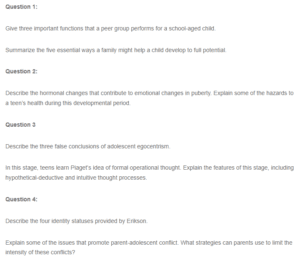Understanding Adolescence and Puberty
Question 1
The three important functions that peer groups perform for a school-aged child are to provide primary status for identity formation, teach morality, and improve psychological development and interpersonal abilities. Consistently, five fundamental ways a family might help a child develop to cull potential include focusing on the child’s health. Healthy children are often more productive in sports, school, home, and other things than unhealthy children. Therefore, children should eat good food and exercise to ensure children have quality preventive health care. Keeping children healthy helps them be more successful in life and at school. Secondly, exposing kids to diverse experiences allows them to explore and try out new things, which helps them find new skills, which in turn develop new abilities that will be vital and important for their entire lives (Sigelman & Rider, 2021).
Thirdly, it opens children’s worlds through adventure and travel because traveling earlier in life has a positive impact on children’s learning as it teaches children so much about history and geography and introduces them to new cultures, things, and people, widening their horizons and sparking their sense of exploration and curiosity. Teaching them the essence of hard work also helps children grow to their full potential. Finally, families should encourage independence and self-sufficiency as it helps kids succeed in everything they do. Allow children to make their own decisions and demonstrate confidence in their abilities while giving support and guidance, as this will help them grow into responsible persons in the future (Sigelman & Rider, 2021).
Question 2
The hormonal changes that contribute to emotional changes in puberty occur when the body gets to a particular age, and the brain releases a gonadotrophin-releasing hormone that instigates puberty alterations. Consistently, more hormones are produced – follicle and luteinizing hormones. These hormones contribute to the emotional changes in puberty (Mastrotheodoros et al., 2020). One of the hazards to teen health during puberty is the use of substances. Once children reach puberty, they are influenced into trying new things due to peer pressure, so they are likely to abuse drugs. They will also be involved in risky sexual behaviors, exposing them to sexual engagement too early. At this age, depression would be a worrying factor as teenagers are more conscious of their image and body; therefore, any changes might affect and even depress them, more so if they are shamed or laughed at by their friends.
Question 3
The three false conclusions of adolescent egocentrism are personal fables where adolescents believe they are unique and different from every other person. Secondly, the invincibility fable, where adolescents believe they are invincible. Finally, adolescents believe they are imaginary audiences because they believe they are the center of other people’s attention, just like they are the center of their attention (Sigelman & Rider, 2021). The idea of formal operational thought by Piaget is categorized by more organized reason, plus the ability to deliberate about abstract thoughts. The other features include hypothetical, deductive, and intuitive thought. Hypothetical thought is reasoning that entails possibilities and propositions that might never reflect reality. Deductive thought, on the other hand, is reasoning from a general premise, principle, or statement through logical steps to deduce specific things. Finally, inductive reasoning is thinking from one or more facts or experiences to a general conclusion that may be less cognitively progressive than deduction. It is sometimes called bottom-up reasoning (Sigelman & Rider, 2021).
Question 4
The four identity statuses by Erikson are identity diffusion, moratorium, foreclosure, and identity achievement. Identity diffusion is a state of not possessing or not developing a distinct identity. On the other hand, the moratorium is a status that defines the people still discovering in an effort to develop a personality but not yet making any commitments. Thirdly, foreclosure status is the status where people have dedicated themselves to a personality without exploring alternatives. Identity achievement is a status where people have experienced a period of exploring and have made occupational, interpersonal, and ideological value commitments (Sigelman & Rider, 2021).
Some of the issues that cause parent-adolescent conflicts are music, leisure time, clothing, and the use of phones. Most importantly, the conflict between parent and adolescent is due to the increased ability for logical reasoning among the youths, which leads them to want reasons for things they had previously accepted without question. Their developing critical-thinking abilities make them less likely to obey their parents’ wishes the way they were when they were children. Some strategies parents can use to limit these conflicts are acting by creating a routine, giving choices, spare time for weekly discussions, take time to listen, understand, and observe the teenagers (Mastrotheodoros et al., 2020).
References
Mastrotheodoros, S., Van der Graaff, J., Deković, M., Meeus, W. H., & Branje, S. (2020). Parent-adolescent conflict across Adolescence: Trajectories of informant discrepancies and associations with personality types. Journal of Youth and Adolescence, 49(1), 119-135.
Sigelman, C. K., & Rider, E. A. (2021). Life-span human development, Cengage Learning.
ORDER A PLAGIARISM-FREE PAPER HERE
We’ll write everything from scratch
Question

Understanding Adolescence and Puberty
Question 1:
Give three important functions that a peer group performs for a school-aged child.
Summarize the five essential ways a family might help a child develop to full potential.
Question 2:
Describe the hormonal changes that contribute to emotional changes in puberty. Explain some of the hazards to a teen’s health during this developmental period.
Question 3
Describe the three false conclusions of adolescent egocentrism.
In this stage, teens learn Piaget’s idea of formal operational thought. Explain the features of this stage, including hypothetical-deductive and intuitive thought processes.
Question 4:
Describe the four identity statuses provided by Erikson.
Explain some of the issues that promote parent-adolescent conflict. What strategies can parents use to limit the intensity of these conflicts?

